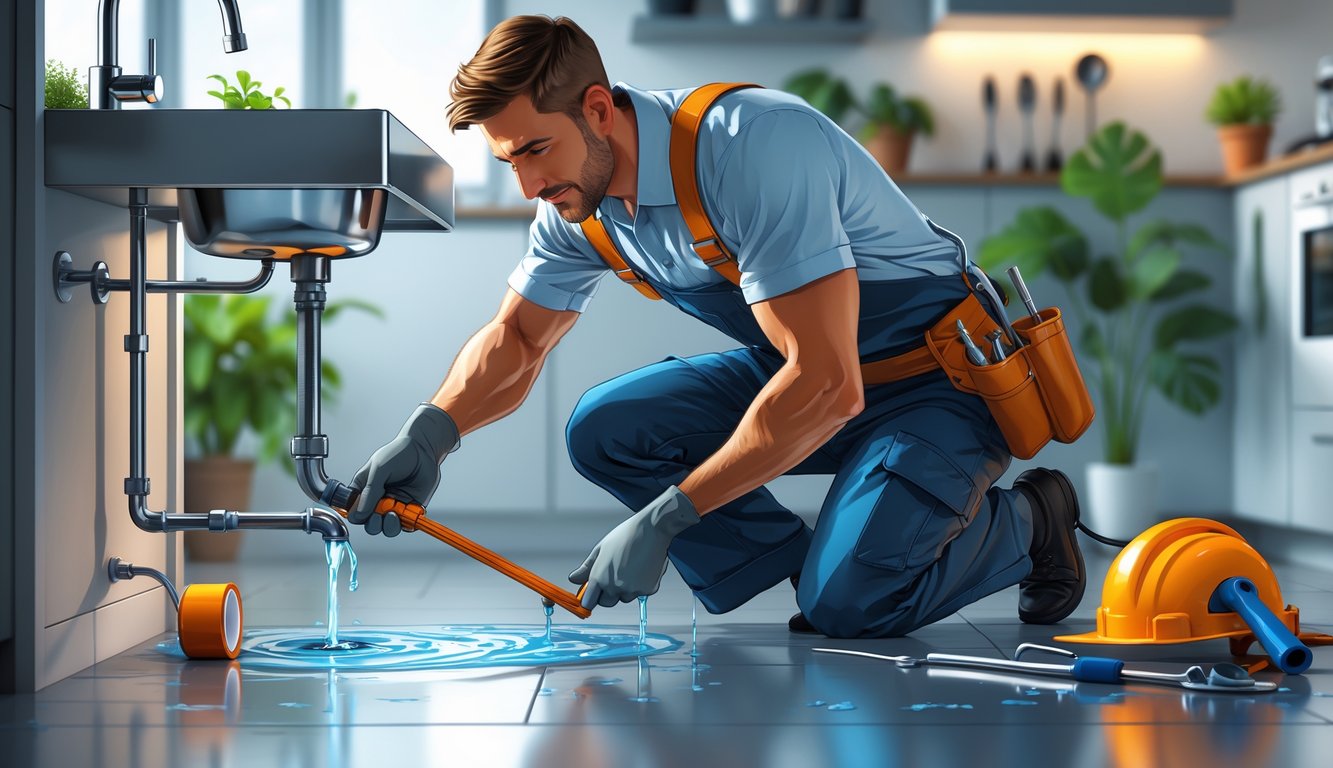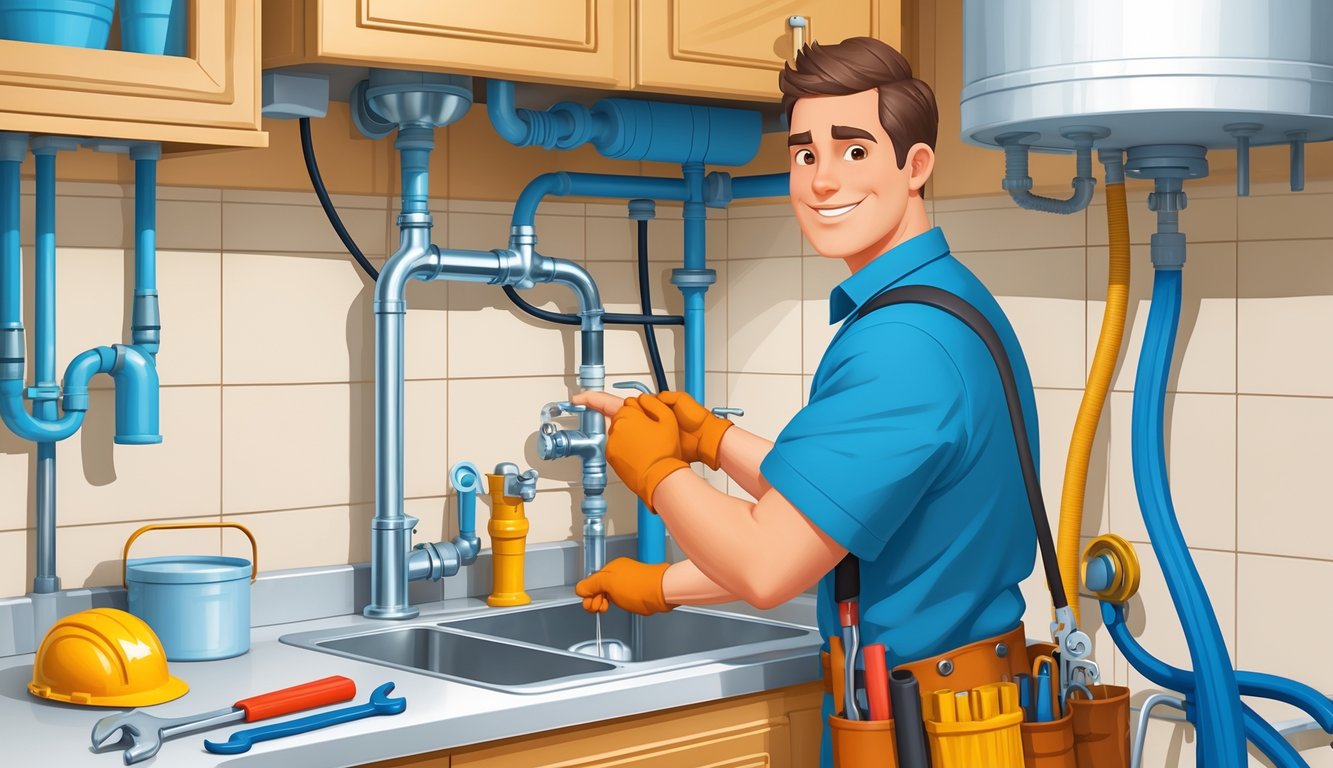So, here’s the thing—I’m still losing my mind over the drip under my kitchen sink. Not just the drip, but the fact that almost everyone I know, myself included, just panics and grabs a towel instead of, you know, actually shutting off the water. And don’t get me started on how impossible it is to find the shut-off valve when you need it. I did a little survey during that freeze last winter—asked three neighbors, only one of them could find the valve in under two minutes. That’s not a great average. Plumbers? All they want is for us to stop the water, open up the drains, throw on some plumber’s tape, or just stick a bucket under the mess. That’s it. My uncle’s been a plumber for decades, and he’s always muttering about how more than half his emergency calls would’ve been, like, a third the price if people just did that before dialing him up.
I keep hearing people whine, “But I’m not handy!” as if grabbing duct tape near a leaky pipe is gonna fry them alive—unless you’re bathing in a wall socket, relax. I looked up that National Association of Home Builders thing (2024, if you care), and apparently, most people just call the plumber before even touching a thing. Sure, if you want a swimming pool in your living room, skip the shut-off. It’s like seeing a fire, yelling for help, and then making popcorn. Nobody’s logical until their socks are floating.
Recognizing a Plumbing Emergency

Honestly, I can’t wrap my head around how a totally normal Tuesday night can turn into a disaster because of one weird gurgle or a puddle that just pops up out of nowhere. Everyone thinks a plumbing emergency means water blasting everywhere and a plumber bursting through the door, but really, missing the early stuff is what wrecks your floors or lets black mold move in (which, by the way, is way nastier than anything on HGTV).
Common Signs of Imminent Plumbing Disasters
If your basement’s turned into a river, yeah, that’s a crisis, but the warning signs are always smaller and somehow more annoying: pipes clanking like angry ghosts, water stains creeping across the ceiling (seriously, they spread so fast it’s like watching time-lapse fungus), or that gross rotten egg smell—does anyone actually check for a sewer leak before the tub starts burping? My brother’s a real plumber (not just some guy with a wrench), and he always says if your water pressure tanks and a faucet starts hissing, just run to the main shut-off. Don’t wait for the floor to start warping.
And the “slow drain isn’t a big deal” crowd? Please. I’ve lost count of how many root invasions started with a tub that just wouldn’t empty. If your dishwasher backs up water, that’s basically a neon sign saying “expensive repair inbound.” The most ignored one, though, is that weird musty smell behind cabinets—apparently top three for hidden insurance claims. Go figure.
Assess the Situation Quickly
People panic and just start mopping, like that’s going to help. I watched my neighbor do it for twenty minutes before realizing the leak was actually upstairs. Megan Torres, who’s an actual emergency plumber (not just TikTok famous), tells people to check if the leak’s still going or if it stopped after you shut something off. Simple, but most people forget. I’m guilty too—half the time I forget where my main is, so I stuck a huge arrow on it. Before you call anyone, figure out where the water’s coming from: is it a fixture, a wall, or outside (if it’s outside, congrats, you might have a supply line break). And for the love of everything, don’t just shut off the nearest fixture and call it a day. Main valve first, then call your insurance, then take photos. Seriously, photos. Two adjusters I know say missing photos are the top reason claims get denied.
Don’t poke holes in the wall or blast the heat to “dry things out.” That’s just asking for more damage and a plumber who’s going to judge you, hard. And never, ever use electrical stuff near standing water. I know it sounds obvious, but apparently not.
Identifying Plumbing Issues Early
Why am I the only one who notices the toilet bubbling when the washer drains? That’s not normal. It means your main sewer’s probably plotting against you. It’s easier to ignore than a full-on flood, but it’s also way cheaper to deal with early. Look for the little stuff: shadows by the baseboards, random hot spots on the wall (not ghosts, just leaks—though my crawlspace feels haunted sometimes).
If you keep resetting the water heater, here’s a fun fact: it’s probably corroded inside, and by the time you call for help, you’ll be buying a new one. Even tiny drips matter—a drip every few seconds wastes more than 20 gallons a day (EPA says so, if you’re into stats). Why do people just let that go? I don’t get it.
So if your faucet’s been “crying” all week or you hear water when nothing’s on, don’t just hope for the best. Early fixes are way cheaper and less stressful. Sometimes all you need is a wrench and some Teflon tape. Waiting for disaster is just borrowing anxiety from the future.
First Steps: Safeguarding Your Home

Why do the worst leaks always show up when my hands are full and the dog’s losing his mind? Those first few minutes? Make or break for your sanity and your floors. And don’t trust flood insurance to save you. Nobody thinks to shut off the water, and electricity is just waiting to make things worse.
Shut Off the Water Immediately
Water’s gushing, and plumbers everywhere are screaming “shut it off!” but apparently, towels are still everyone’s first move. Towels do nothing. Just get to the nearest shut-off. Faucets and toilets have their own little knobs—turn them clockwise. I watched an entire kitchen fill up because nobody touched the tiny valve under the sink. Later, the contractor said every minute of delay can double your repair bill. Not exaggerating.
Sometimes, though, there’s no local valve or you just can’t get to it without getting soaked. That’s when you have to go for the main shut-off. Emergency response guides (I skimmed one from 2024) say that’s your only real shot. Buckets? They’re just a sad attempt at hope.